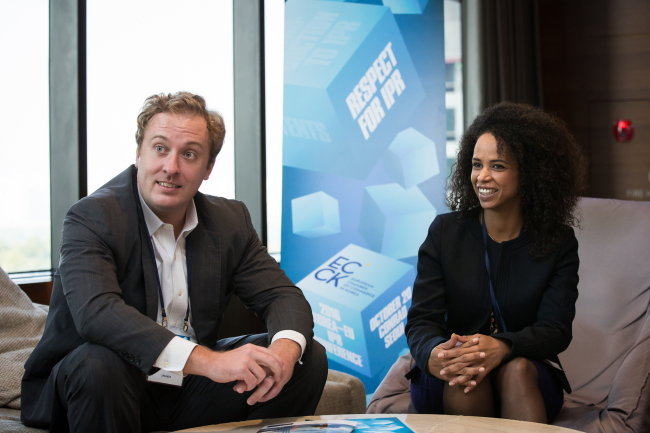[Herald Interview] Korea needs to better protect intellectual property against illicit trade: experts
By Park Ga-youngPublished : Oct. 30, 2016 - 15:38
South Korea needs to ramp up its efforts to protect intellectual property rights in its combat against illicit trade, two experts who came to Seoul to attend the 2016 Korea-EU Intellectual Property Rights Conference, hosted by the European Chamber of Commerce in Korea, told the Korea Herald earlier this month.
A team led by Chris Clague, senior editor of the Economist Intelligence Unit (EIU), had published the Illicit Trade Environment Index prior to the event hosted by the European Chamber of Commerce. The index gauges the extent to which 17 Asia-Pacific countries enable illicit trade. It measured four categories: intellectual property, transparency and trade, customs environment, and supply and demand.
A team led by Chris Clague, senior editor of the Economist Intelligence Unit (EIU), had published the Illicit Trade Environment Index prior to the event hosted by the European Chamber of Commerce. The index gauges the extent to which 17 Asia-Pacific countries enable illicit trade. It measured four categories: intellectual property, transparency and trade, customs environment, and supply and demand.

South Korea came fifth out of the 17 countries studied in the Asia-Pacific, but was the lowest-ranked developed economy in the category of intellectual property.
“A fair number of countries in the region have relatively strong intellectual property laws on the books, but that doesn’t really matter unless they are actually enforced,” Clague told The Korea Herald on Oct. 20. “The area of enforcement is where Korea struggled in the index.”
Clague said the size of illicit trade is, by nature, difficult to estimate, but it is set to grow as the global markets have become more integrated through many trade agreements like Trans-Pacific Partnership, the Regional Comprehensive Economic Partnership and the ASEAN Economic Community.
According to Lina Baechtiger, executive director of the European Chamber of Commerce in Singapore, which commissioned the index, governments need to take illicit trade more seriously, calling for more public-private partnership.
“Illicit trade -- fake airbags, car parts, fake alcohol, fake tobacco -- poses a threat to public health, public safety, the environment and tax revenues for the government,” Baechtiger told The Korea Herald.
“Brand owners need to sit down together to share intelligence with the government,” said Baechtiger, pointing out a lack of knowledge-sharing between brand owners and governments despite growing illicit trade.
Clague agreed and said that Asia-Pacific countries also suffer from such lack of intelligence sharing.
“Throughout the region, individual countries and customs agencies have an idea what needs to be done to combat illicit trade but there is very little information sharing,” he added, “If they were to improve just a little bit, it would help prevent illicit trade.”
In addition to posing a threat to individuals and governments, illicit trade also provides funds for transnational crime networks, terrorist organizations and regimes that support illicit trade, Clague said.
“(The Islamic State group) makes a lot of money with illegal shipments of oil and illicit cigarettes and North Korea is also widely known to be supplier of illicit cigarettes and fake bills like super notes,” Clague noted.
South Korea also underperformed in the supply and demand of illicit goods, dragged down by relatively high taxes and social security burdens and its labor market regulations, according to the EIU report.
But the nation topped the rankings in the transparency and trade category which measures the strength of the governance it exercises over its free trade zones and the depth of cooperation it pursues with stakeholders.
Clague said that the index would be published every few years to track improvements in the region, and he hopes that the illicit trade environment index could ultimately help move policy amid integration of global markets.
By Park Ga-young (gypark@heraldcorp.com)








![[Graphic News] More Koreans say they plan long-distance trips this year](http://res.heraldm.com/phpwas/restmb_idxmake.php?idx=644&simg=/content/image/2024/04/17/20240417050828_0.gif&u=)
![[KH Explains] Hyundai's full hybrid edge to pay off amid slow transition to pure EVs](http://res.heraldm.com/phpwas/restmb_idxmake.php?idx=644&simg=/content/image/2024/04/18/20240418050645_0.jpg&u=20240419100350)






![[From the Scene] Monks, Buddhists hail return of remains of Buddhas](http://res.heraldm.com/phpwas/restmb_idxmake.php?idx=652&simg=/content/image/2024/04/19/20240419050617_0.jpg&u=20240419175937)

![[KH Explains] Hyundai's full hybrid edge to pay off amid slow transition to pure EVs](http://res.heraldm.com/phpwas/restmb_idxmake.php?idx=652&simg=/content/image/2024/04/18/20240418050645_0.jpg&u=20240419100350)

![[Today’s K-pop] Illit drops debut single remix](http://res.heraldm.com/phpwas/restmb_idxmake.php?idx=642&simg=/content/image/2024/04/19/20240419050612_0.jpg&u=)